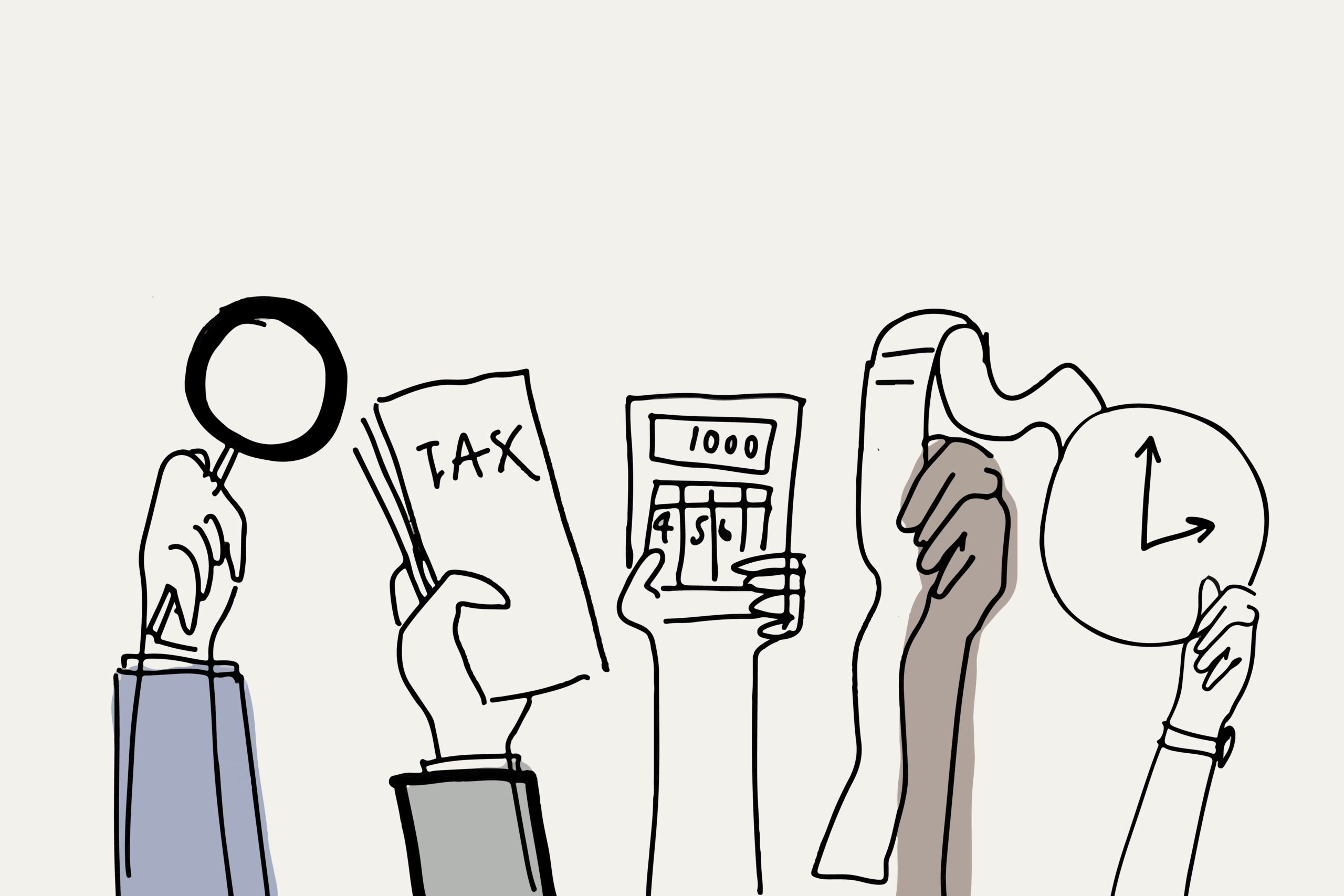Because of the immediate aftermath of Santa has some unpleasant surprises in store for business. It is a challenging time for both companies and individuals. Everyone will feel individually the changes that have just been published.

The most important changes to the Tax Code include:
As regards corporate income tax
- The annual tax loss realised from 2024 onwards is recovered at a rate of 70% of the taxable profits earned in the following 5 consecutive years, and that realised up to 2024 at the same rate of 70%, but over 7 years;
- the facilities for deducting cash register purchases from corporation tax are abolished. Expenditure on the purchase of cash registers is deductible and may be subject to the reinvested profit facility;
- the expenses for the proper functioning of nurseries and kindergartens managed by the taxpayer and the amounts paid by the taxpayer for the placement of children of employees in early education units will be included in the category of limited deductible social expenses, but not more than 1,500 lei/month per child;
- expenses for the operation, maintenance and repair of service housing will be deductible up to the limit corresponding to the built-up areas provided for by the Housing Law no. 114/1996 – no tax increase of 10%;
- new limited deductible expenses are introduced:
- 50% of the value of operating, maintenance and repair expenses related to a registered office acquired by the taxpayer in residential buildings or individual residential buildings in residential complexes defined according to legal provisions, which is not used exclusively for business purposes. If the taxpayer’s registered office is used for personal purposes by shareholders or associates, the expenses in question are considered to have been incurred in their favour and are not deductible when calculating the taxable income.
- The same 50% deductibility also applies to: the value of operating, maintenance and repair costs relating to premises located in a dwelling owned by an individual and used for personal purposes, corresponding to the areas made available to the taxpayer under contracts concluded between the parties for this purpose.
- the redirection of sums for sponsorship and/or patronage will be carried out up to the deadlines for filing the annual income tax return (the previous deadline was 6 months from the date of filing the annual income tax return).
- the 30% deduction rate for the allowance for impairment of receivables is restored (previously it was 50%). This provision applies from 15.12.2023
- a new limitation is introduced for the deduction of excess costs of inter-affiliate indebtedness. The deductible limit is the RON equivalent of €500,000.
The total excess costs of indebtedness resulting from transactions with both related and unrelated persons which may be deducted in a tax period may not exceed the deductible ceiling represented by the RON equivalent of EUR 1,000,000.
As regards the tax on the income of micro-enterprises
The definition of micro-enterprise is amended as follows:
- as regards the condition of ownership by partners/shareholders of three micro-enterprises, it is stated that the 25% ownership can be direct/indirect and applies to one company only;
- the timely filing of annual financial statements is also introduced to meet the definition of micro-enterprise;
- as regards the revenue threshold of EUR 500 000, clarification is made that this threshold is calculated taking into account the aggregate revenue of related enterprises according to Law 346/2004;
- the exceptions for HORECA are abolished as from the tax year 2024.
- the facilities for sponsorships, cash register deductions are eliminated. Microenterprise income tax for 2023 is redirected according to the provisions in force until 31 December 2023.
These changes to corporate income tax, i.e. the income of micro-enterprises, take effect from 1 January 2024.
From 1 January, micro-enterprises will be taxed as follows:
- 1%, for micro-enterprises with revenues not exceeding €60,000 inclusive and not carrying out the activities referred to in the next point;
- 3% for micro-enterprises which:
- have revenues exceeding EUR 60 000; or
- carry out main or secondary activities corresponding to CAEN codes:
- 5821 – Computer game publishing activities,
- 5829 – Publishing activities of other software products,
- 6201 – Custom software development activities (client-oriented software),
- 6209 – Other information technology service activities,
- 5510 – Hotels and similar accommodation,
- 5520 – Holiday and short-stay accommodation facilities,
- 5530 – Caravan parks, camping sites and campsites,
- 5590 – Other accommodation services,
- 5610 – Restaurants,
- 5621 – Event catering activities,
- 5629 – Other food service activities n.e.c.,
- 5630 – Bars and other drinking activities,
- 6910 – Legal activities – only for professional companies with legal personality, established by lawyers according to law,
- 8621 – General medical practice activities,
- 8622 – Specialised health care activities,
- 8623 – Dental practice activities,
- 8690 – Other human health activities.”
On income tax and compulsory social contributions
- Clarifications are provided on how to apply the monthly ceiling of 10,000 lei provided for income tax and social security contribution facilities for income from computer software development, construction, agriculture and food industry and when an employee earns income in the same month from several successive employers;
- Clarification is provided on the monthly ceiling of 3 basic salaries/remuneration granted to employees/managers applicable to the allowances for delegation and secondment, at home and abroad, granted from December 2023;
- With regard to salary income which is not taxable income within the monthly ceiling of up to 33% of basic salary, some changes are made:
- the amount of 400 lei that could be granted for the telemonth scheme (as well as the provision on the non-taxation of this amount) is eliminated;
- the cost of sports subscriptions is reduced from €400 to €100/year (the limit is also applied to the deduction for subscriptions paid by employees);
- the favourable difference between the negotiated preferential interest rate and the market interest rate for loans and deposits is included;
- the amounts paid by the employer for the early education of employees are included, up to a limit of 1,500 lei/month for each child.
- For income from the transfer of the use of personal property, the option to determine the net income in the real system is eliminated, and for the determination of the net income a flat rate of 20% is introduced as a deduction of expenses; Rules are introduced for the determination and withholding of tax on income from the transfer of the use of property paid by legal entities;
- With regard to tax losses for certain types of income (self-employment, intellectual property, gain on transfer of securities) the same provisions as for corporate income tax will apply with regard to the limit as well as the number of carry forward years (up to 70% of the annual net income from the same source of income in the following 5 consecutive tax years);
- The possibility for taxpayers to dispose of the allocation of up to 3.5% of their income tax to support non-profit entities or to grant private scholarships remains valid only for income from wages and salaries (starting with the income of 2024);
- Clarification on the employee’s option to pay/waive the contribution due to the privately administered pension fund for the income of employees in IT, construction, agriculture and food industry – the procedure for exercising the option can be established by the employer by regulation/any other internal document;
In general, the provisions relating to social contributions due on income from wages and salaries are in line with the income tax provisions mentioned above;
Most of the changes or additions will come into force from January 2024 or with income for 2024.
Concerning VAT
- a 50% limit is introduced on the right to deduct VAT on the purchase, rental or leasing of buildings, whatever their purpose, situated in residential areas or blocks of flats, and on the tax relating to expenditure on such buildings, where they are not used exclusively for business purposes. The provisions shall enter into force on the first day of the month following the date from which Romania is authorised to apply a special measure derogating from the provisions of Council Directive 2006/112/EC of 28 November 2006 on the common system of value added tax, as amended and supplemented.
- a new condition is introduced for obtaining the certificate of deferment of payment of VAT in customs – the person must not have outstanding tax liabilities administered by the A.N.A.F. and any other budgetary debts identified in enforceable titles issued according to the law and existing in the records of the central tax body for recovery purposes and must not have outstanding budgetary liabilities, proven on the basis of an affidavit made available to the customs authority;
- the definition of ‘added sugar’, applicable in the context of the non-harmonised excise duty on sugar-containing beverages and the standard rate of VAT on foods containing sugar, is reworded to clarify that products assimilated to sugar (e.g. cane sugar, brown sugar, fruit syrup, date nectar, jam sugars) when added as ingredients are taken into account for determining the added sugar content.
- in addition to cakes and biscuits, milk powder for newborn babies, infants and young children is excluded from the category of foods with added sugar for which 19% VAT will apply from 1 January 2024.
- Change VAT from 5% to 9%:
- Applies to social housing that meets certain conditions. However, the 5% rate will be maintained until 31.12.2024 if advances have been received for the dwellings in question by 31.12.2023.
- The same rate changes will apply to photovoltaic panels and their components;
- VAT change from 5% to 19% – for entry to sports events and for use of sports facilities from 9% to 19% – rate changes for added sugar products.
Concerning excise duties
- The update of excise duty on petrol and diesel products with the increase in consumer prices is staggered in two stages as follows:
- from 1 January 2024, by 50% of the increase in consumer prices;
- from 1 July 2024, by 50% of the increase in consumer prices.
The obligation that the delivery of products from tax warehouses or from the place where they have been received by the registered consignee is carried out only when the supplier holds the payment document certifying the transfer to the state budget of the amount of excise duty related to the quantity to be invoiced, has been extended from energy products to excisable products such as sparkling wines, apple/pear cider, mead.
- Both the certified consignee certificate and the certified consignor certificate will be valid from the date of issue and not, as at present, from the 1st of the month following that in which the application for registration was approved.
- The obligation to show excise duty separately on the invoice only applies to economic operators who produce and market in Romania products subject to non-harmonised excise duty, if they are required to issue an invoice under Article 319.
Amendments to other legislation with an impact on the activity of economic agents:
- The penalty for non-compliance by users of electronic tax tallying machines with the deadlines set by law to use electronic tax tallying machines will apply, from 1 October 2024, to economic operators who make supplies of goods or services through vending machines. The sanctions concern the application of a fine from 8,000 lei to 10,000 lei, as well as the confiscation of unjustified amounts; the suspension of the economic operator’s activity at the establishment selling goods or providing services, until the electronic tax tallying machine is equipped and proof of payment of the fine or half of its amount is presented.
Measures to strengthen financial discipline on cash receipts and payments:
- The ceiling for advance payments for settlement is increased from 1000 lei to 5000 lei.
- “Superstores” and “hypermarkets” are defined and it is stipulated that, in their case, as well as in the case of cash and carry stores, the cash amounts in the cash registers cannot exceed, at the end of each day, the ceiling of 500,000 lei (compared to 50,000 lei as previously provided). Cash exceeding the ceiling is deposited in the bank accounts of these persons within two working days
- branches and other secondary offices of legal entities which have their own cash office and/or an account with a credit institution shall apply the provisions of the law to each cash office accordingly.
- a penalty is introduced for making collections/refunds of credits and other cash financing – a fine of 25% of the amount collected/paid, but not less than 500 lei.
These provisions entered into force on 15 December 2023.
The RO E-Invoice system
- It provides, from 1 July 2024, the obligation for taxable persons established in Romania to submit electronic invoices via the RO E-Invoice system within 5 calendar days from the date of issue of the invoice, but no later than 5 calendar days from the deadline for issuing the invoice.
- For non-compliance with the above provision, fines will be imposed depending on the category of taxpayer (fines vary between 1,000-10,000 lei).
- From 1 July 2024, simplified invoices will not be subject to transmission via the e-Invoice system.
- As of 1 July 2024, both the issuance of invoices and their receipt and registration by issuers, respectively recipients, taxable persons established in Romania, other than through the RO e-Invoice channel, for B2B transactions, shall be sanctioned with a fine of 15% of the total value of the invoice, both for the supplier and the buyer.
- The periods when the RO e-Invoice system is not operational will be published on the websites of the National Tax Administration Agency and the Ministry of Finance, and the transmission obligation is suspended for this period.
New obligations for non-profit legal entities (Accounting Act 82/1991) which, in the reporting year, received grants, sponsorships, redirected amounts and other similar forms of funding, regardless of their cumulative amount. As from the annual financial statements for the financial year 2023, they shall draw up a statement accompanying the annual financial statements and shall disclose the amounts thus received or used.
PFA – self-employed activities
New for PFAs is the introduction of a CASS ceiling of 60 minimum wages.
This means that self-employed persons will have a new ceiling for CASS payments of 10%. They would have to pay 10% on net income if they have less than 60 minimum wages. If they have more, then it will be capped at 60.
People who own PFAs earning up to 6 minimum wages, and who did not earn income from wages of this amount in the previous year, will owe the 10% rate on 6 minimum wages.
RO E-transport system
From 15 December 2023, the obligation to report via RO e-Transport international road consignments of goods (related to import/export/intra-Community acquisitions/intra-Community deliveries), regardless of the category of goods transported (i.e. not only for high tax risk goods), is introduced;
The obligation to declare in the RO e-Transport System the data relating to the international transport of goods is incumbent on the following users:
- the consignee entered on the customs import declaration or the consignor entered on the customs export declaration;
- the recipient in Romania, in the case of intra-Community acquisitions of goods;
- the supplier in Romania, in the case of intra-Community supplies of goods;
- the warehousekeeper, in the case of goods subject to intra-Community transactions in transit;
- Failure to comply with the obligation to declare international consignments of goods in the RO e-Transport system is punishable by a fine of between 20,000 lei and 100,000 lei in the case of legal persons, and by confiscation of the value of undeclared goods.
- The obligation for the transport operator to equip the transport vehicles with telecommunication terminal devices using satellite positioning and data transmission technologies, on which the software of the National Centre for Financial Information is installed, and the obligation for the transport operator to ensure the transfer of the current positioning data of the transport vehicles covered by the declaration throughout the entire journey is provided for.
Penalties for non-compliance with the new obligations concerning the international carriage of goods by road will enter into force from 1 July 2024.



